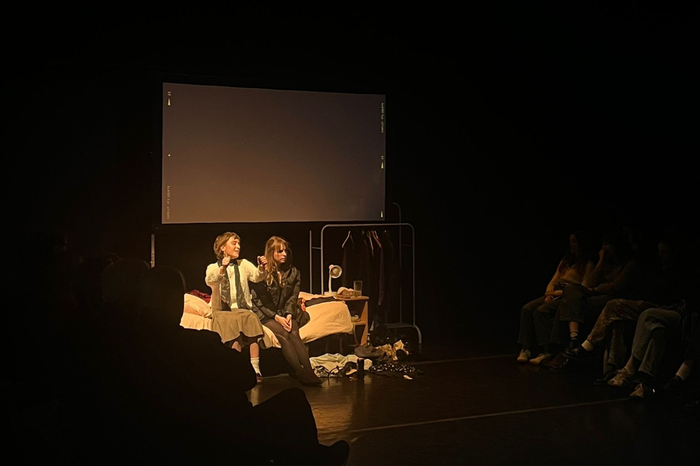Negotiating With the Dead is alive with potential
After a rocky start, Negotiating With the Dead strikes gold.

In the L-shaped Corpus Playroom, a woman (Milly Kotecha) sits and sews the red cross on a knight’s tunic as the audience filters in. It’s a shrewd preface to a play in which crafts such as sewing and knitting subtly underpin the themes of grief, faith and humanity. It provides a calm focus against a stage rather cluttered with set – some of which is, bafflingly, never utilised at all.
When the Crusaders finally enter the action of this play, it is in stark contrast to what has come before. The opening scenes, in which we first encounter the search for the mythical Templar’s Cross, are slightly patchy. Writer-director Amie Brian’s script is sometimes disfigured by an over-hasty interruption or the occasional stumbling over lines. Yet the Crusaders display a more scrupulous acting style than the archaeologists, which allows the poeticism of Brian’s language to shine through.
Clearly, it was only an input of energy that was required to set the play on the right track. The respective talents of both halves of the cast – the archaeologists and the knights – become evident after the initial Crusader scene, and the acting becomes far more convincing. This is not a condemnation of the opening cast, however. The performance is never unwatchable, and the strongest actors are able to carry the scenes in which weaknesses appear in the script. Irisa Kwok as Esther is particularly commendable on this part.
“The play has clearly been written by someone with a keen interest in the subject”
In contrast to the larger-scale scenes, an intimate vignette between Florine (Marta Zalicka) and Aliya (Milly Kotecha) revels in the sheer joy of archaeology. The play has clearly been written by someone with a keen interest in the subject, as the subtle excitement expressed in dialogue over a Saxon sewing needle reveals a very human joy in humanity’s smallest moments.
Humanity is what this play interrogates most diligently – even more so than faith - and the range of humanity demonstrated on stage is immense for such a compact play. From Elijah (Aaron Gillett) and Imran’s (Prabhoda CS) dual depictions of the joys and despairs of fatherhood, to the touching portrayal of Florine’s grief in her losses, Brian effortlessly portrays the variety of human emotion. This is exemplified in the cathartic description of Florine’s dream. Without spoiling, there comes a moment at the end where the character struggles to reconcile the power of faith with her deep disillusionment. Florine appears to spiral out of control - but Zalicka is in firm command on her craft, delivering an impassioned, moving monologue.
Faith is the other major theme of this play - its complexities are anchored by the near-constant presence of the cross in the centre of the stage. When this cross is absent, the action becomes more turbulent and begins to spiral out of control, emphasising the need for some kind of faith system in everyday human life.
“The range of humanity demonstrated on stage is immense for such a compact play”
For faith, it is suggested, is never a concrete thing. Isaiah (Izzy Lane) appears grounded, if naïve, upon first meeting with the Crusaders. Yet his deterioration over the course of the play reveals the need for spiritual stability which no amount of fighting in the Holy Land can provide. Inversely, the depths of Elijah’s (Gillett) despair in his faith steadily rise to its rehabilitation through the mingling of his blood with the coveted cross in one of the final scenes.
As I have said, it is the scenes with the Crusaders that truly shine. Isaiah (Lane), Elijah (Gillett), Tom (Aryan Misra) and Abraham (Amie Brian) complement one another perfectly, whilst Florine’s lingering in the liminal space between the past and present creates a sense of unease. Similarly, though, Zalicka and Kwok bounce off one another to great effect, heightening the intensity of any scene that they share.
“The plot raises vital questions about faith and humanity. What is faith? Is it worth fighting for?”
Sometimes the recorded sound effects helped the play along, and sometimes they were rather passive. The reading of the Lord’s Prayer in one scene emphasises the intensity of anguish contained therein, yet some of the more ambient sound choices were almost jarring with the scene that had come before or which followed. The play might have benefitted slightly from some tweaking here.
Rose Beedle and Antonia Hristova’s costume design is most effective in its simplicity. Whilst the high-vis jackets are somewhat redundant, the costumes clearly distinguish past from present characters (particularly helpful when actors are playing characters in both halves). Necessity may have bred conservatism, but it is effective here.
In all, Negotiating With the Dead is a thoroughly enjoyable play once it finds its grounding. Although sometimes bogged down by large words out of place in general conversation, the script is effective when well-acted. This acting is largely on-point and the plot raises vital questions about faith and humanity. What is faith? Is it worth fighting for? And what is the cost?
‘Negotiating With the Dead’ is showing at the Corpus Playroom from Wednesday 13th until Saturday 16th November, at 9:30pm.
 News / Clare Hall spent over £500k opposing busway 24 December 2025
News / Clare Hall spent over £500k opposing busway 24 December 2025 Comment / The ‘class’ of Cambridge24 December 2025
Comment / The ‘class’ of Cambridge24 December 2025 News / Caius mourns its tree-mendous loss23 December 2025
News / Caius mourns its tree-mendous loss23 December 2025 Comment / Yes, I’m brown – but I have more important things to say22 December 2025
Comment / Yes, I’m brown – but I have more important things to say22 December 2025 News / Girton JCR publishes open letter expressing solidarity with Palestine25 December 2025
News / Girton JCR publishes open letter expressing solidarity with Palestine25 December 2025










